- Home
- Janice Kay Johnson
Yesterday's Gone (Two Daughters Book 1) Page 9
Yesterday's Gone (Two Daughters Book 1) Read online
Page 9
Karen wiped her eyes, nodded and looked at Bailey steadily. “What were you like then? When you realized he was gone?”
“Terrified,” Bailey admitted. “First that he’d come back, then that he wouldn’t.” Ashamed as always to admit that, she launched into automatic justification that was also truth. “I...knew nothing but life with him. I didn’t talk much for a long time. With him, I was supposed to answer when he asked me something, but otherwise keep my mouth shut. I learned—” No, she didn’t have to say this: that she’d learned not to scream when he hit her or did that, no matter how much it hurt. Not to cry until she was alone. Eventually, not to cry at all. Sharing that much would only hurt this woman, who loved Hope, if not Bailey.
“You learned?”
She scrambled for something else to say. “I tried to drink up as much knowledge as I could without him noticing. A lot of the time, he didn’t pay much attention to me. I could pick up old newspapers, or magazines that had been left in the lobby of the motels or diners or wherever, and watch TV when he wasn’t there. I listened to conversations whenever I could. Despite everything, I was curious.”
“You were a very bright little girl. You’d taught yourself to read before you started kindergarten. It was a shock when you started reading road signs to me.” Despite tears in her eyes, Karen smiled. “And the speedometer. One day, you said, ‘Mommy, that sign says thirty-five, but there it says forty.’ You pointed at the speedometer and looked so disapproving.”
On a tiny flare of shock, Bailey remembered silently noticing the speedometer when he was going too fast, too, although he didn’t very often. Of course he’d been afraid of being pulled over. She would never have said anything to him anyway.
She had educated herself. When she was first put into school—into special ed—she’d felt so stupid. But one day a teacher’s aide working with her had smiled when Bailey finished reading a passage aloud, and she’d gushed, “I can’t believe how fast you’ve advanced. You should be proud of yourself. You must be a very smart girl, Bailey.”
That was the first time she remembered anyone ever telling her she was smart. Or maybe they had and she just didn’t believe it. But that day she felt a glow, and she did believe. After high school, she let herself forget for a few years, but the time had come when she’d taken a hard look at her life and thought, I can do more than this.
She had the sudden wish she’d told the aide how much those words had meant to her. Maybe hugged her. She knew she hadn’t. She’d still been very withdrawn.
Now she felt her lips curving. “To this day, I never exceed the speed limit. Friends have teased me about driving like a little old lady.”
Karen chuckled, then teared up again. “Oh, my,” she murmured, dabbing at her eyes again.
“Will you tell me more about us as a family, before I disappeared?” Bailey asked impulsively. “If I liked pink so much, I must have been into girlie things.”
That had the other woman smiling again. “Yes, you loved dressing up, and insisted on being a princess for Halloween. You took dance lessons, but you played soccer, too. Considering your age, you were a fearsome goalie!” The smile became sad. Bailey could tell that for this moment, Karen Lawson saw the past more clearly than the present. “You were a daddy’s girl. You’d run to meet him when he came in the door after a day’s work. He’d have grease embedded in his hands, and you didn’t care! When you were little, you wanted up. Kirk would swing you into the air, and you’d chortle and he’d laugh.” Grief moved through her eyes. “I haven’t heard him laugh like that since.” So softly, Bailey barely heard her, she added, “Or at all.”
For an instant, Bailey heard that laugh, deep and happy, as if a ghost hovered in the room with them. My imagination, she told herself sharply. Words came from her against her will. “He...doesn’t look like a man who often laughs.”
“He’s never been much of a talker. It took him longer than it should have to ask me to marry him, because he was convinced he wasn’t good enough for me, a teacher with a college degree. I didn’t know what was holding him back. I thought he couldn’t figure out how to put it in words. I was about to propose to him when he finally said, ‘I’ll understand if you say no, but...’”
The rising amusement surprised Bailey. “Doom and gloom, huh?”
“He did the voice of Eeyore in Winnie the Pooh really well.”
They both giggled.
Bailey had a panicked thought. How do I know what she’s talking about? At twelve years old—as it turned out, really eleven—she’d been way too old to be read Winnie the Pooh stories. She knew vaguely about Pooh Bear and his honey and all that, but not because she’d ever read the books or seen a video. But Eeyore’s deep, slow, hopeless voice was there, embedded in her memory.
The suffocating feeling came from nowhere. “I...remember,” she whispered.
“What?” Her mother stared at her.
“I think... I must remember.” She pressed a hand to her chest. Breathe.
“Oh, sweetheart.”
“No. Maybe I saw a video somewhere. One of the younger kids in a foster home was watching it.” She talked faster and faster. “That makes sense.” Relief freed her chest from that crushing grip. “I can’t possibly remember—”
“You can.” Her mother touched her hand, tentative but gentle. “You will, when you’re ready.”
Deep inside was a cry: No, no, I can’t.
Long habit made her deft at changing the subject, but even so she saw that Karen—Mom—knew what she was doing and why but chose to let it go.
* * *
HAVING DECIDED TO go into work today, Saturday or not, Seth was on a call when Bailey’s number came up. “I’ll get back to you,” he said hastily, and transferred to the incoming call. “Bailey?”
He heard her voice, muffled. “Please allow me to shop in peace.”
He surged to his feet, understanding immediately what was happening. “Where are you?”
“Walgreens. If you’re busy... I shouldn’t have called.” Just like that, she was gone.
He bounded down the stairs and ran across the parking lot to his vehicle, ignoring stares. Fortunately, the drugstore was on his side of town, a distance he covered in about three minutes. Barely suppressing his rage, he pushed his way through the glass doors. A clerk to his left was gaping at the small crowd blocking the end of an aisle.
“Where is your manager?” Seth snapped. “Get him. Now.”
She was fumbling with her phone when he passed.
He found what he expected—Bailey trapped midaisle, bodies blocking her way from all directions, microphones thrust at her.
“Police in Bakersfield say you didn’t remember the name of your abductor. Will you comment, Ms. Lawson?”
“Were you sexually molested?”
Seth’s voice boomed above them as he pushed his way through. “That’s enough. If you’re not here to shop, you’re trespassing. Back off,” he snarled at a cameraman who tried to block him.
Bailey was utterly expressionless, so pale she looked like a marble statue. Only her eyes teemed with distress.
“She has no comment,” he declared, looking from one avid face to another. “Under these circumstances, she will accept no questions. Do you hear me?”
“Detective, has she given you any more information than she did Bakersfield police?”
“I cannot comment about an ongoing investigation. Now please excuse us.”
He gripped her arm and moved forward. They had broken through the crowd when he spotted the manager hurrying from the back of the store. Seth knew Troy Gaskins, who had always seemed like a good guy. He looked almost as mad as Seth felt.
“All of you!” he snapped. “Out of here. I will not allow a customer to be treated this way. Detective Chandler, if they don’t depart now, I’m going to request you start making arrests.”
Protesting, they shuffled out. Camera flashes went off. Bailey stood rigid beside him, gripping the handles of a
shopping basket that held several items. Her white-knuckled hands held on as if they were all that kept her from plunging into an abyss. She said nothing until the last reporter had gone outside. Then she said, “I need to pay for these things.” Her voice was almost steady.
“No need,” the manager said. “Sonia, please bag Ms. Lawson’s items for her.” When she tried to argue, he shook his head. “I regret that an incident like this occurred in my store. It’s the least I can do.”
“I don’t mind—”
“Please,” he said simply.
She bit her lip, then nodded and set the basket on the counter. “Thank you.”
Still gaping, the clerk moved the few items into a plastic bag and handed it over. “Have a nice day,” she said, then flushed at the inappropriateness.
Bailey managed a weak smile for her. “Thank you.”
Seth steered her toward the doors. She balked when he put out a hand to open one.
“They’re still out there.”
“They know better than to get in our way,” he said grimly.
“But...they’ll follow me.”
“Come to the station. You can hang out for a while, until they give up.”
Her laugh broke. “Hang out at the police station.”
Goddamn it. He’d found Hope Lawson, achieved a miracle. And this was the result.
He unclenched his jaw. “Do you have a better idea?”
“No. No, I suppose I don’t.” She peeked at him, almost shyly. Color tinged formerly colorless cheeks. “I’m sorry. This is my fault. I didn’t think. I needed—”
He’d seen what she needed, and, yes, she’d had to shop unless she were to ask him to pick up something so personal to any woman.
“It’s not your fault,” he said roughly. “This was an obscenity. I half expected it, but I deluded myself the press would behave with some decency. I was wrong.”
“You warned me.”
“They must have seen why you were here.”
Her blush deepened. “Yes.” Suddenly a smile curved her mouth. “At least they didn’t ask whether I’m secretly pregnant. You know, with a monstrous eighteen-year-old fetus.”
Startled into a bark of laughter, Seth said, “God. I can see it on the cover of a tabloid.”
“Complete with picture of the newborn, already needing to shave,” she agreed, still smiling.
“You’re a gutsy woman, Bailey Smith.” Damn, he wanted to kiss her. “So, what do you say? I know the safest hangout in town.”
The humor sparkling in her eyes and lingering on her lips, she shrugged the straps of her handbag over her shoulder. “How can I say no to an offer like that?”
He wanted to kiss her as he’d never wanted anything in his life.
“Let’s move fast,” he said brusquely, ignoring her startled look as he pushed open the door.
* * *
BAILEY FELT LIKE a kid stuck waiting in a doctor’s or attorney’s office while the adults held conversations that passed right over her head. It was ridiculous—she had a book, she could have played a game on her phone, but instead she sat in an oversize, not very comfortable chair and felt petulant. Did her lower lip stick out? At least she hadn’t yet whined, I’m bored.
Part of the trouble was that all she wanted to do was watch Seth Chandler, and she’d been doing her best not to let herself. This...fascination wasn’t normal for her. She couldn’t afford to feel like this for a man. Couldn’t trust the feelings or him, even if he had been nothing but kind to her so far and had rushed to her rescue like some kind of superhero leaping into the air, cape flying behind him.
Okay, exaggeration. But still.
She had entertained herself watching the other detectives come and go, eavesdropping shamelessly on their phone conversations, which unfortunately lacked drama. She heard a lot of things like, “Yes, I can wait.” Or, “Uh-huh.”
“Please repeat that,” was another frequent flyer.
This being Saturday, she was surprised to see so many detectives working. There were empty desks, but some of their owners might be working, too, just out at crime scenes or doing interviews or whatever else detectives did. Out of the seven she saw, only one was female. Another young woman, Bailey pegged as a clerk. The woman detective was middle-aged, with enough crow’s feet beside her eyes, Bailey felt sure the lack of gray in her hair was thanks to her hairdresser. She looked and sounded maternal, which Bailey could see really working with some witnesses or suspects.
Most of the men were middle-aged and older, too. A number sported potbellies and had to hoist their pants when they rose from behind their desks to pour another cup of coffee. The two youngest were Seth and the guy who sat behind him, who somebody had called Kemper. Kemper had a face almost attractive enough to qualify him as a model. Every angle and plane was sharply, beautifully cut. Blond hair was still considerably darker than Bailey’s and cut short, emphasizing the pure lines of his face. Occasionally she felt his scrutiny but refused to turn and look at him. Once their eyes met, his brows rose slightly and he nodded, his mouth quirking with what she thought was amusement. His eyes were blue, also like hers, but darker, shadowed somehow. Objectively, he was really much better looking than Seth, she decided, but her body didn’t soften for him the way it did for Seth’s rough-cast face and stockier, stronger body.
She spent an embarrassing amount of time eyeing Seth sidelong, taking care that he didn’t catch her ogling him. And really, that’s not what she was doing. She was more...assessing him. Trying to figure out why just looking at him made her feel so much that was unfamiliar.
Small, wiry men repelled her, no surprise there. Even during her high school years and early twenties, when she believed her ability to attract guys was all she had going for her, she wouldn’t have touched someone who looked like him with a ten-foot pole. Otherwise, she hadn’t been discriminating enough to be able to say what attracted her or what didn’t. The guy had never been the point. Whether she especially liked him or not wasn’t the point. Her needing some kind of validation—that was the point. She didn’t know any other way to be noticed, wanted. Something. Going cold turkey had been something she had to do for herself. It took her a while to realize what a relief it had been not to do or say anything because of what a guy would think, to dress to please herself and no one else, to refuse to let her body feel anything sexual, which—face it—had ugly connotations for her.
So she couldn’t understand this. It was circumstances, she tried to convince herself. He’d cared enough to search for her, and now had become her anchor in a world turned on end. And, yes, he had a great body, muscular but not in a hulking way. If he lifted weights at all, he probably had a bench set up in a spare bedroom or his garage, and she seriously doubted he studied himself in a mirror anytime he wasn’t shaving. His dark hair was shaggier than Detective Kemper’s, and in midafternoon like this, his jaw was dark with the beginning of stubble. Which, God help her, was sexy on him. Maybe sexier, because she knew it wasn’t a conscious look for him, like it was for so many guys where she came from. Hollywood had made stubble the look. She wondered what Seth would say if she told him he was trendy right now.
She made herself pretend she was engrossed in checking messages on her phone. There were none, thank God; apparently no member of the press or paparazzi had coaxed anyone to give out her number yet.
That sent a wave of disbelief crashing over her. Paparazzi and Bailey Smith in the same sentence. Impossible. And terrifying, if she let herself think about it, because she couldn’t go back to the life she’d had and had no idea what the alternative was. The future had just become a giant whiteboard, clean and pristine, without even a trace of writing on it to guide her.
The panic filled her until she shot to her feet. When Seth lifted his head in surprise, she said, “It’s been ages. I think I can go now.”
The lines in his face deepened. “I wouldn’t bet on that.”
“Will you look?”
“All right.” G
aze never leaving hers, he pushed his chair back and stood. Only when he reached the window did he look away from her. After a moment, he said, “I don’t see anyone. Doesn’t mean they aren’t watching your car.”
“What difference will another hour make?” She needed to get out of here now. The cabin sounded like heaven right now. She could sit on a rock and watch the water flow by, breathe in the stillness and scent of evergreens.
He sighed. “Maybe none. All right. I’ll walk you down.”
She was ahead of him going down the stairs. Partway, he said heavily, “I’m sorry, Bailey.”
Stopping, she gripped the handrail and turned. “For what?”
“My crusade has made your life hellish. It’s not something I foresaw.”
She believed in his regret, but remembered what he’d said the other time they’d talked about this: that, even knowing what would come of it he’d do the same again, because finding her had meant so much to the Lawsons. He’d known them longer; it made sense that they ranked higher in his list of priorities than she did. So why was he the only person here in Stimson who actually saw her, Bailey, not Hope all grown-up?
She shook off the perplexing thought. “You didn’t foresee what’s happening because you didn’t think you’d find me alive.”
He winced. “Something like that.”
“We can’t go back,” she said briskly, and started down the stairs again. The question inevitably rose in her mind: Would she go back if she could?
Not answering that.
She considered herself a fatalist. So much in her life had been out of her control. Everything, when she was with him. Her only privacy was inside her head. He couldn’t tell her what to think. So that’s where she’d retreated.
The foster care system had much the same impact. She had no say over where she lived, what the house rules were, even what was for dinner or who she shared a bedroom with. Only in the past few years had she finally taken control, understood that she could shape her own life.

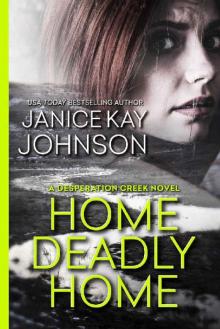 Home Deadly Home
Home Deadly Home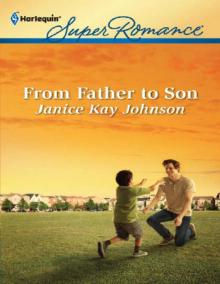 From Father to Son
From Father to Son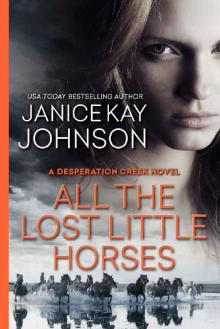 All the Lost Little Horses (A Desperation Creek Novel Book 2)
All the Lost Little Horses (A Desperation Creek Novel Book 2)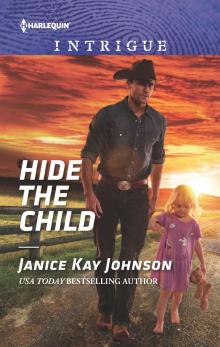 Hide the Child
Hide the Child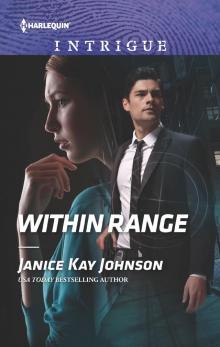 Within Range
Within Range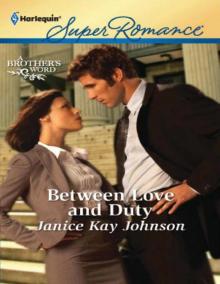 Between Love and Duty
Between Love and Duty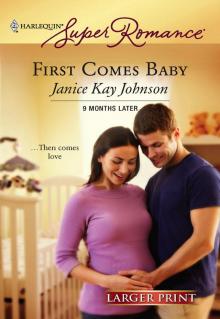 First Comes Baby
First Comes Baby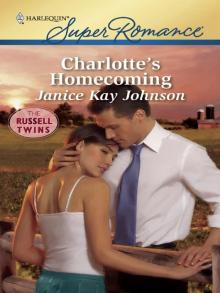 Charlotte's Homecoming
Charlotte's Homecoming In A Heartbeat (HQR Superromance)
In A Heartbeat (HQR Superromance)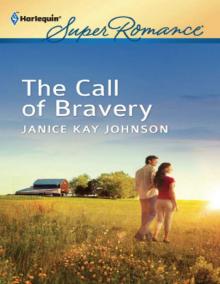 The Call of Bravery
The Call of Bravery In Hope's Shadow
In Hope's Shadow Anything for Her
Anything for Her Harlequin Superromance September 2014 - Bundle 1 of 2: This Good ManPromises Under the Peach TreeHusband by Choice
Harlequin Superromance September 2014 - Bundle 1 of 2: This Good ManPromises Under the Peach TreeHusband by Choice The Baby Agenda
The Baby Agenda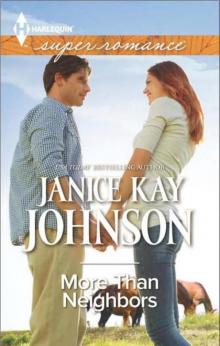 More Than Neighbors
More Than Neighbors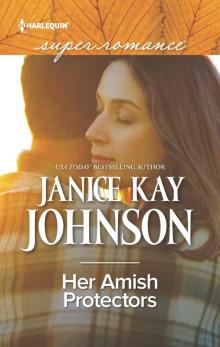 Her Amish Protectors
Her Amish Protectors All That Remains
All That Remains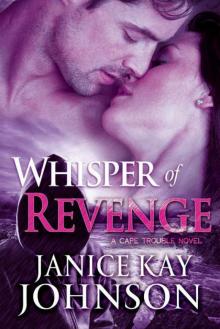 Whisper of Revenge (A Cape Trouble Novel Book 4)
Whisper of Revenge (A Cape Trouble Novel Book 4)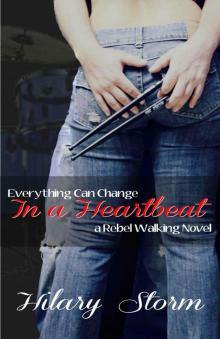 In a Heartbeat
In a Heartbeat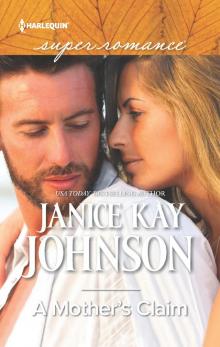 A Mother's Claim
A Mother's Claim Because of a Girl
Because of a Girl Back Against the Wall
Back Against the Wall Dangerous Waters
Dangerous Waters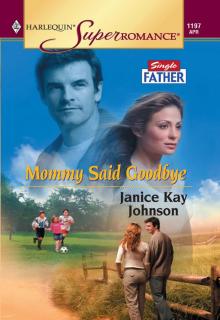 Mommy Said Goodbye
Mommy Said Goodbye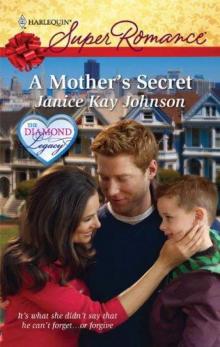 A Mother's Secret
A Mother's Secret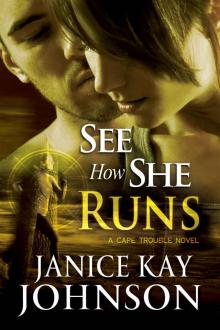 See How She Runs (A Cape Trouble Novel Book 2)
See How She Runs (A Cape Trouble Novel Book 2) Plain Refuge
Plain Refuge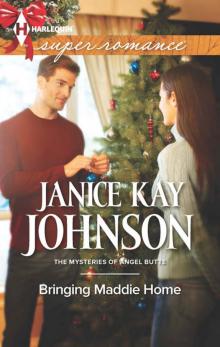 Bringing Maddie Home
Bringing Maddie Home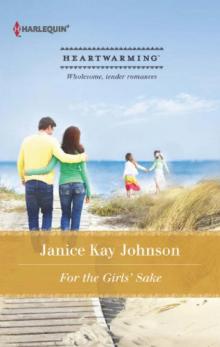 For the Girls' Sake
For the Girls' Sake Through the Sheriff's Eyes
Through the Sheriff's Eyes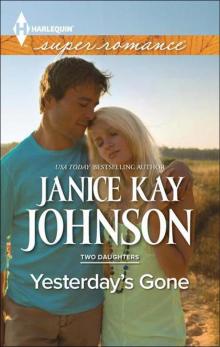 Yesterday's Gone (Two Daughters Book 1)
Yesterday's Gone (Two Daughters Book 1)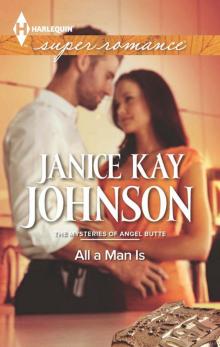 All a Man Is
All a Man Is Harlequin Superromance January 2014 - Bundle 1 of 2: Everywhere She GoesA Promise for the BabyThat Summer at the Shore
Harlequin Superromance January 2014 - Bundle 1 of 2: Everywhere She GoesA Promise for the BabyThat Summer at the Shore No Matter What
No Matter What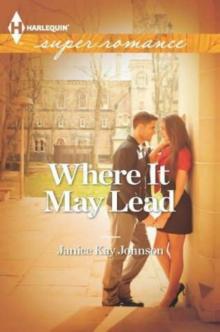 Wakefield College 01 - Where It May Lead
Wakefield College 01 - Where It May Lead Someone Like Her
Someone Like Her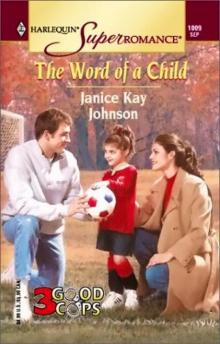 THE WORD OF A CHILD
THE WORD OF A CHILD Harlequin Superromance May 2016 Box Set
Harlequin Superromance May 2016 Box Set Open Secret
Open Secret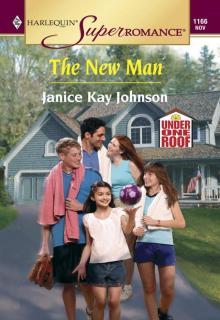 The New Man
The New Man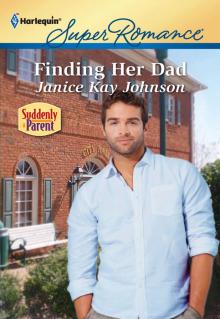 Finding Her Dad
Finding Her Dad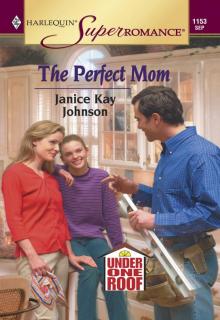 The Perfect Mom
The Perfect Mom All Through The House
All Through The House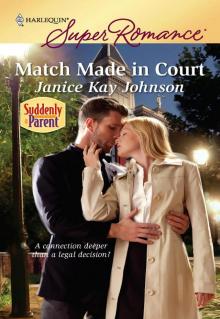 Match Made in Court
Match Made in Court Making Her Way Home
Making Her Way Home From This Day On
From This Day On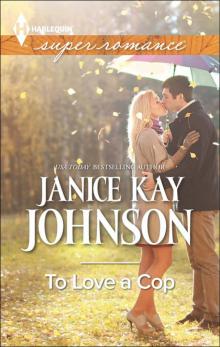 To Love a Cop
To Love a Cop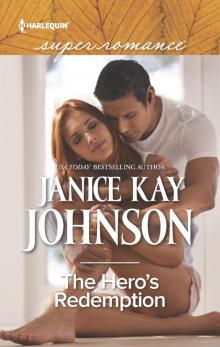 The Hero's Redemption
The Hero's Redemption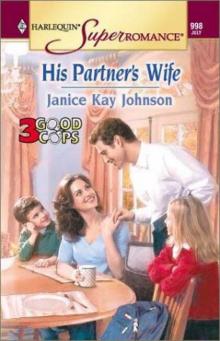 HIS PARTNER'S WIFE
HIS PARTNER'S WIFE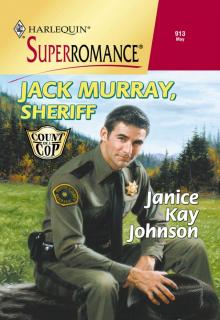 Jack Murray, Sheriff
Jack Murray, Sheriff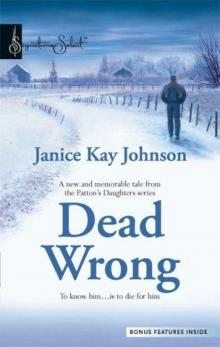 Dead Wrong
Dead Wrong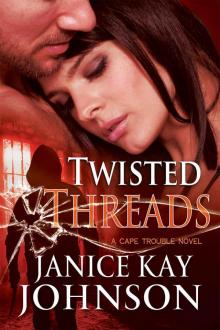 Twisted Threads (A Cape Trouble Novel Book 3)
Twisted Threads (A Cape Trouble Novel Book 3)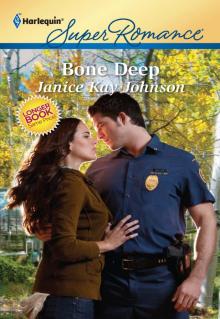 Bone Deep
Bone Deep The Closer He Gets
The Closer He Gets With Child
With Child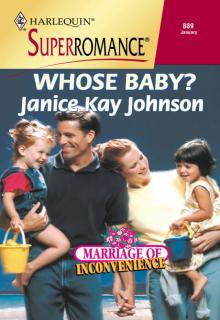 Whose Baby?
Whose Baby? Kids by Christmas
Kids by Christmas